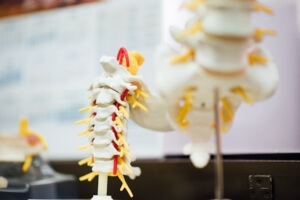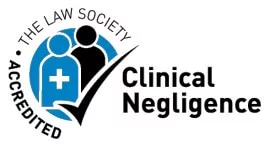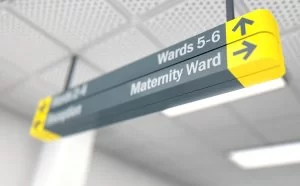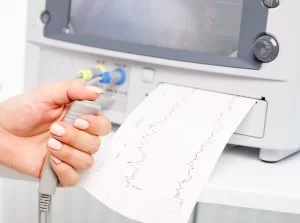Cauda Equina Syndrome Claims
Cauda Equina Lawyers
Cauda Equina Syndrome is a serious spinal injury that can cause permanent disability if not treated urgently. If your diagnosis or treatment was delayed, you may be entitled to claim compensation. Speak to an expert Cauda Equina Syndrome lawyer for specialist advice.

“Osbornes handles a wide range of high-value and complex clinical negligence cases, with particular expertise in birth injury, delayed cancer diagnosis, spinal injury, and fatal claims.”
“Osbornes Law offers experience in obstetric and fatal claims as well as niche cauda equina cases.”
Expert Legal Support for Cauda Equina Syndrome Compensation Claims
The cauda equina, meaning ‘horses tail’ in Latin, is the name given to the bunch of nerve roots found at the bottom of the spinal cord, and Cauda Equina Syndrome arises when these nerves are damaged. Cauda Equina Syndrome is a rare but serious spinal condition that requires urgent medical attention. If not diagnosed and treated quickly, it can lead to life-changing consequences, including paralysis, incontinence, and permanent nerve damage. When delays in diagnosis or treatment are caused by medical negligence, you may be entitled to claim compensation
At Osbornes Law, our expert medical negligence solicitors have successfully secured substantial compensation for clients affected by Cauda Equina Syndrome, including one of the largest Cauda Equina Syndrome compensation awards in UK legal history. We are here to guide you through the claims process.
What is Cauda Equina Syndrome?
Cauda Equina Syndrome occurs when the bundle of nerves at the base of the spine, the cauda equina, is compressed. These nerves control movement and sensation in the legs, bladder, bowel, and sexual function.
- Common symptoms include:
- Severe lower back pain
- Numbness or tingling in the saddle area (between the legs)
- Bladder or bowel dysfunction (incontinence or retention)
- Weakness or numbness in the legs
- Sexual dysfunction
Early diagnosis is critical to prevent permanent damage. Any GP who suspects Cauda Equina Syndrome will advise their patient to proceed immediately to A&E for an emergency MRI scan. The scan will usually show whether or not immediate surgery is required.
When is Cauda Equina Syndrome caused by Medical Negligence?
Cauda Equina Syndrome is sometimes misdiagnosed or not treated in time due to errors by healthcare professionals. When these failures lead to long-term harm, they may amount to medical negligence.
- Common examples of negligent care include:
- Failure to recognise red-flag symptoms during GP or A&E visits
- Delayed MRI scans or referrals to spinal specialists
- Misinterpretation of imaging results
- Delays in emergency surgery after diagnosis
These avoidable errors can mean the difference between a full recovery and a lifetime of disability.
Can I claim compensation for Cauda Equina Syndrome?
Yes, if your CES was made worse because of delayed or negligent medical care, you may be entitled to compensation. A successful claim can cover:
- Loss of earnings (past and future)
- Private medical treatment and rehabilitation
- Home adaptations or mobility aids
- Pain and suffering
- Care and support needs
Each case is unique. Our lawyers will carefully assess how your life has been affected to ensure you receive the full compensation you deserve.
Why Choose Osbornes Law?
At Osbornes Law, we have a long-standing reputation for handling complex and high-value medical negligence claims. Our specialist solicitors understand the devastating impact Cauda Equina Syndrome can have and work hard to claim compensation for our clients.
We also represent clients affected by orthopaedic negligence, including cases of spinal injury where surgical mistakes or delayed diagnoses have caused serious harm.
We are independently recognised for our work including:
- Ranked in The Legal 500 and Chambers & Partners as a leading firm for clinical negligence, with particular praise for our expertise in spinal injury claims and serious, life-changing cases.
- Several of our lawyers are members of the Association of Personal Injury Lawyers (APIL), reflecting our commitment to the highest standards of practice and client care.
When you instruct Osbornes, you can be confident that you’re in safe, experienced hands.
Recent cases:
Record Compensation Award
Our Head of Medical Negligence, Hugh Johnson, recently secured record compensation for a woman who suffered permanent disability after delays in diagnosing Cauda Equina Syndrome. Despite repeated visits to A&E with classic symptoms, her condition was not properly investigated, leading to irreversible damage.
£2.6 million payout
Our team secured £2.6 million in compensation for a 76-year-old man who suffered a spinal haematoma and subsequent Cauda Equina Syndrome following complications after routine surgery.
The claims process: What to expect
We understand that starting a medical negligence claim can feel overwhelming, especially when you’re already dealing with serious health issues. Our role is to make the process as straightforward and supportive as possible.
Here’s what you can expect:
- Free, confidential consultation – We’ll talk through your experience, explain whether you may have a valid claim, and outline your options.
- Thorough evidence gathering – We’ll obtain your medical records, consult independent experts, and build a clear picture of how negligence occurred.
- Guidance at every stage – From valuation to settlement negotiations or court proceedings, we’ll keep you informed and supported throughout.
- No win, no fee funding – Most of our Cauda Equina Syndrome claims are handled on a no win, no fee basis, so there’s no financial risk to you.
How long do I have to make a Cauda Equina Syndrome claim?
In most cases, you have three years from the date of injury or from when you first became aware of the negligence. If you’re unsure about time limits, speak to us as soon as possible.
Contact Osbornes Law for expert advice
If you or a loved one is living with the consequences of Cauda Equina Syndrome and believe medical negligence played a part, we’re here to help. Our award-winning team has the experience and compassionto guide you through every step of the claims process, and to fight for the compensation you deserve.
To speak with one of our solicitors, contact us by:
- Filling in our online enquiry form; or
- Calling us on 020 7485 8811
Cauda Equina Syndrome FAQ
How common is Cauda Equina Syndrome?
Cauda Equina Syndrome affects 1-3 people per 100,000 population in England and there are around 8,000 suspected cases every year. (source)
Is Cauda Equina Syndrome life-threatening?
Cauda Equina Syndrome is not a life-threatening condition, but delays in diagnosis or treatment can result in permanent, life-changing harm. Without urgent medical care, patients may experience irreversible nerve damage, including paralysis, loss of bladder or bowel control, and chronic pain.
He also has a niche specialism in claims involving cauda equina syndrome.
Osbornes Law offers experience in obstetric and fatal claims as well as niche cauda equina cases.
They know the law inside out and proactively work with counsel to drive cases forward. They are a go-to for complex claims.
Ben Posford, head of catastrophic injury, is well-known for spinal cord and cauda equina claims, including high-profile fatality work.
Osbornes handles a wide range of high-value and complex clinical negligence cases, with particular expertise in birth injury, delayed cancer diagnosis, spinal injury, and fatal claims.
I am always happy to get instructions from Osbornes. They have excellent quality work, the team knows exactly what they are doing and are a real pleasure to work with. Excellent legal knowledge.
The team has excellent leadership and provide an above and beyond service for their clients.
A close knit team with excellent knowledge and technical acumen across the board.
You get a real sense that they care about clients and each other, working together to get the best results.
The team works very well together as they are genuinely kind and friendly people.
Small but very effective and experienced team so every client benefits from the personal touch but also highly skilled litigation know-how. Capability of the team means they can handle all aspects of very complex cases as well as straightforward matters.
Ben Posford typically operates in the team’s spinal cord and cauda equina syndrome litigation.
Ben Posford leads the catastrophic injury team and regularly represents claimants in neurological injury and fatal accident claims. He also has a niche specialism in claims involving cauda equina syndrome.
"Ben Posford’s particular expertise in this area focuses upon cauda equina claims, of which he is an undisputed powerhouse."
"Straightforward and clear, he is good at cutting through the noise."
"Totally tenacious but brilliantly commercial; very impressive."
"Incredibly impressive; he not only knows the technical ins and outs but is a charismatic personality, one clients absolutely love and trust."
"Affable and charming with very good client-handling skills."
"Offers specialist expertise in cauda equina syndrome cases."
"Osbornes often handles claims valued at over £1m, particularly relating to severe brain and spinal cord injuries and niche areas such as cauda equina syndrome and cycling accidents."
"Intellectually rigorous and intelligent."
Client StoriesVIEW ALL
- 13.8.2025
Record Cauda Equina Compensation Settlement
Record Cauda Equina Syndrome compensation secured after delayed treatment Hugh Johnson acted on behalf of Mary, a 38 year old who...
Read more - 13.8.2019
£2.6m Settlement for Cauda Equina Syndrome
Osbornes Law secured £2.6 million in compensation for a 76-year-old man who suffered a spinal haematoma and subsequent Cauda Equina Syndrome...
Read more - 19.6.2019
High Court victory for Cauda Equina Syndrome Claim
High Court victory for former nursery worker Background of the Case Medical Negligence Solicitors at Osbornes Law represented former nursery...
Read more
Insights From our Medical Negligence Lawyers VIEW ALL
- 3.3.2026
New Report Exposes Fundamental Failures in NHS Maternity...
Baroness Amos’ interim report lays bare a maternity system “not working for women, babies and families.” Last week the government-commissioned...
Read more - 30.10.2025
Addenbrooke’s Hospital Complaints
Review finds harm to children by surgeon at Addenbrooke’s Hospital An independent review by Cambridge University Hospitals NHS Foundation...
Read more - 6.10.2025
Osbornes Law Proud to Support the Oscar’s...
We were honoured to be the Headline Sponsor of the Oscar’s Wish Foundation’s 10th Anniversary Charity Ball on...
Read more - 1.10.2025
Jess’s Rule Rolled Out in England to...
Jess’s Rule establishes a “three strikes and rethink” approach for GP practices to prevent avoidable missed diagnoses deaths. The...
Read more - 2.9.2025
New Medical Negligence Head for Osbornes to Spearhead...
Hugh Johnson joins Osbornes Law to lead the firm’s medical negligence team Hugh Johnson has been appointed as new...
Read more - 27.8.2025
HSSIB Review Exposes NHS Maternity Failures
Patient safety body HSSIB publishes exploratory review of maternity and neonatal services As Head of Paediatric and Birth Negligence cases...
Read more - 12.5.2025
Complaints Against Suspended Surgeon Ms Kuldeep Stohr
Ms Kuldeep Stohr, orthopaedic surgeon at Addenbrooke’s Hospital suspended In February 2025, Cambridge University Hospitals NHS Foundation Trust (CUH) confirmed...
Read more - 4.4.2025
Time To Move On From Physician Associates?
BMA raises concerns over patient safety: the risks of Physician and Anaesthesia Associates in the NHS The British Medical Association (...
Read more - 19.9.2024
Report highlights failings in maternity care
The Care Quality Commission (CQC) has recently carried out a national review of 131 maternity inspections between 2022 and 2024, finding that failures...
Read more - 30.7.2024
What Is the Role Of a Physician Associate?
What does the Position of Physician Associate Mean for the NHS? There are many different jobs within the NHS, each...
Read more - 11.1.2024
New UK Supreme Court Ruling regarding Secondary Victims...
The Supreme Court has today, on the 11th January 2024, upheld the Court of Appeal’s order to dismiss the claims...
Read more - 11.1.2024
Secondary Victim Claims
Secondary victims in clinical negligence cases What is a secondary victim in clinical negligence cases? Most compensation claims are concerned...
Read more - 12.12.2023
NHS Compensation Payouts Guide
What Are NHS Compensation Payouts? In the UK, the National Health Service delivers the vast majority of healthcare services. When...
Read more - 31.8.2023
Can you sue the NHS for waiting times?
The NHS is facing an unprecedented challenge with 7.47 million people waiting for routine treatments. This crisis impacts everyone, from those...
Read more - 31.8.2023
Hyponatraemia – Symptoms, Causes & Negligence
What is hyponatraemia? Hyponatraemia is a condition where sodium levels fall below a certain level, which can be dangerous. All...
Read more - 10.8.2023
Ambulance Delays Affecting Rapid Patient Treatment
Failure to Meet Ambulance Response Targets In 2017, the Secretary of State for Health accepted the new ambulance performance standards recommended...
Read more - 9.6.2023
Early Notification Scheme – is it helping or failing...
What is the Early Notification Scheme? The NHS Early Notification Scheme (“ENS”) has reached its sixth anniversary. Established in April 2017,...
Read more - 23.3.2023
Private Pregnancy Scans and Substandard Care
In the news, it has been reported that private clinics that offer pregnancy scans to women are not meeting the...
Read more - 14.2.2023
Iron Infusion Injury Claims
The risk of extravasation injuries during iron infusion therapy Iron infusions, such as Ferinject, are often recommended for patients with...
Read more - 9.11.2022
Delayed transfer to Accident & Emergency causing harm
The Healthcare Safety Investigation Branch (HSIB) has identified that patients may come at risk of harm whilst waiting in ambulances...
Read more - 9.11.2022
Breast cancer screening mammograms and negligence
Breast cancer screening has improved significantly in the UK due to research bettering the understanding of this terrible disease, which...
Read more - 21.9.2022
Are maternity services safe? – Part 2
In April last year I wrote a piece about government setting up a taskforce to look into why there are...
Read more - 8.9.2022
Poor interpretation of CTG can result in stillbirth...
Poor interpretation of a Cardiotocograph, more commonly known as a CTG, is a leading cause of stillbirth and brain injuries...
Read more - 14.7.2022
Insulin overdose in hospitals due to limited staff...
A century ago, insulin was first used to treat a 14-year-old boy dying of type 1 diabetes. A hundred years later,...
Read more


































